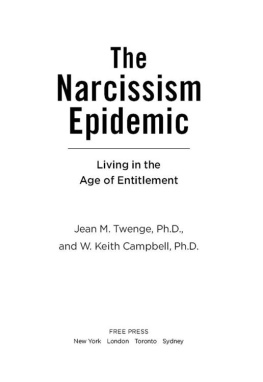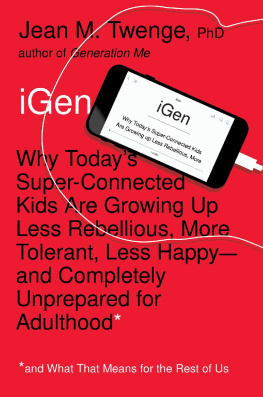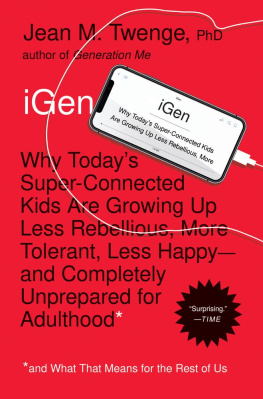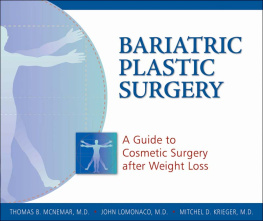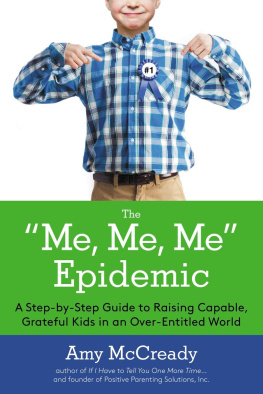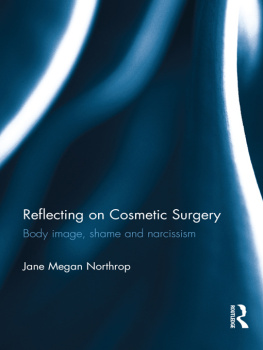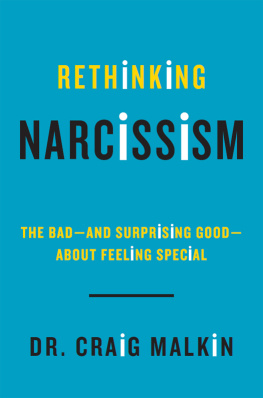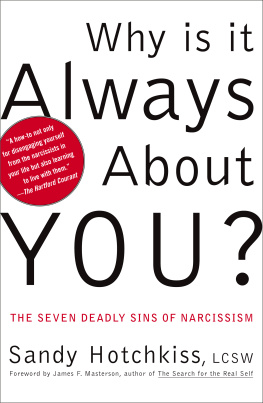Praise for The Narcissism Epidemic
A must-read for anyone who is a parent, a relationship partner, in the workforce, in school, or on the job market. Twenge and Campbell not only define narcissism but detail its antecedents, consequences, and underlying processes in a way that brings together so much of what one sees in modern western culture. Grounded in research and peppered with media and anecdotal stories, The Narcissism Epidemic offers practical, much-needed solutions to coping in the age of entitlement.
K ATHLEEN V OHS , P H .D., University of Minnesota McKnight Land-Grant Professor and coeditor of Self and Relationships: Connecting Intrapersonal and Interpersonal Processes
This insightful book shows us how the epidemic of narcissism touches almost all aspects of our lives. Twenge and Campbells astute analysis and salient anecdotes powerfully map the problem and the high price we all pay. They expertly show us the kinds of actions we can take to free ourselves of the epidemics ruthless grip and how the future well-being of humane society depends on our doing so.
D IANE E. L EVIN , P H .D., Professor of Education at Wheelock College and coauthor of So Sexy So Soon: The New Sexualized Childhood and What Parents Can Do to Protect Their Kids

Free Press
A Division of Simon & Schuster, Inc.
1230 Avenue of the Americas
New York, NY 10020
Copyright 2009 by Jean M. Twenge and W. Keith Campbell
All rights reserved, including the right to reproduce this book or portions thereof in any form whatsoever. For information address Free Press Subsidiary Rights Department, 1230 Avenue of the Americas, New York, NY 10020
FREE PRESS and colophon are trademarks of Simon & Schuster, Inc.
Library of Congress Control No.: 2008044705
ISBN-13: 978-1-4165-7625-9
ISBN-10: 1-4165-7625-8
Visit us on the World Wide Web:
http://www.SimonSays.com
To our daughters:
Kate (J.M.T.)
and
McKinley and Charlotte (W.K.C.)
The Narcissism Epidemic
Introduction
The Growing Narcissism in American Culture
W e didnt have to look very hard to find it. It was everywhere.
On a reality TV show, a girl planning her sixteenth birthday party wants a major road blocked off so a marching band can precede her grand entrance on a red carpet. A book called My Beautiful Mommy explains plastic surgery to young children whose mothers are going under the knife for the trendy Mommy Makeover. It is now possible to hire fake paparazzi to follow you around snapping your photograph when you go out at nightyou can even take home a faux celebrity magazine cover featuring the pictures. A popular song declares, with no apparent sarcasm, I believe that the world should revolve around me! People buy expensive homes with loans far beyond their ability to payor at least they did until the mortgage market collapsed as a result. Babies wear bibs embroidered with Supermodel or Chick Magnet and suck on Bling pacifiers while their parents read modernized nursery rhymes from This Little Piggy Went to Prada . People strive to create a personal brand (also called self-branding), packaging themselves like a product to be sold. Ads for financial services proclaim that retirement helps you return to childhood and pursue your dreams. High school students pummel classmates and then seek attention for their violence by posting YouTube videos of the beatings.
Although these seem like a random collection of current trends, all are rooted in a single underlying shift in the American psychology: the relentless rise of narcissism in our culture. Not only are there more narcissists than ever, but non-narcissistic people are seduced by the increasing emphasis on material wealth, physical appearance, celebrity worship, and attention seeking. Standards have shifted, sucking otherwise humble people into the vortex of granite countertops, tricked-out MySpace pages, and plastic surgery. A popular dance track repeats the words money, success, fame, glamour over and over, declaring that all other values have either been discredited or destroyed.
The United States is currently suffering from an epidemic of narcissism. Merriam-Websters dictionary defines an epidemic as an affliction affectinga disproportionately large number of individuals within a population, and narcissism more than fits the bill. In data from 37,000 college students, narcissistic personality traits rose just as fast as obesity from the 1980s to the present, with the shift especially pronounced for women. The rise in narcissism is accelerating, with scores rising faster in the 2000s than in previous decades. By 2006, 1 out of 4 college students agreed with the majority of the items on a standard measure of narcisstic traits. Narcissistic Personality Disorder (NPD), the more severe, clinically diagnosed version of the trait, is also far more common than once thought. Nearly 1 out of 10 of Americans in their twenties, and 1 out of 16 of those of all ages, has experienced the symptoms of NPD. Even these shocking numbers are just the tip of the iceberg; lurking underneath is the narcissistic culture that has drawn in many more. The narcissism epidemic has spread to the culture as a whole, affecting both narcissistic and less self-centered people.
Like a disease, narcissism is caused by certain factors, spreads through particular channels, appears as various symptoms, and might be halted by preventive measures and cures. Narcissism is a psychocultural affliction rather than a physical disease, but the model fits remarkably well. We have structured the book according to this model, explaining the epidemics diagnosis, root causes, symptoms, and prognosis.
Like the obesity epidemic, the narcissism epidemic has not affected everyone in the same way. More people are obese, just as more people are narcissistic, but there are still those who exercise and eat right, and still those who are humble and caring. Even the less self-absorbed have witnessed narcissistic behavior on TV, online, or in real-life interactions with friends, family, or coworkers. The mortgage meltdown that led to the financial crisis of 2008 was caused, in part, by the narcissistic overconfidence of homebuyers who claimed they could afford houses too expensive for them and greedy lenders who were willing to take big risks with other peoples money. In one way or another, the narcissism epidemic has touched every American.
In the last few years, narcissism has become a popular buzzword, used to explain the behavior of everyone from hooker-obsessed former New York governor Eliot Spitzer to famous-for-being-famous Paris Hilton. Others have diagnosed themselves: former presidential candidate John Edwards explained his extramarital affair by stating, In the course of several campaigns, I started to believe that I was special and became increasingly egocentric and narcissistic. As the New York Times noted, narcissism has become the go-to diagnosis by columnists, bloggers, and television psychologists. We love to label the offensive behavior of others to separate them from us. Narcissist is among our current favorites.
Despite the popularity of narcissism as a label, it is difficult to find scientifically verified information on it outside academic journal articles. Many websites on narcissism are based on some combination of conjecture, personal experience, and poorly understood psychoanalytic theories. Christopher Laschs 1979 bestselling book, The Culture of Narcissism , though fascinating, was written before any serious research explored the personality and behavior of narcissists. Books such as Why Is It Always About You? and Freeing Yourself from the Narcissist in Your Life were written by established psychotherapists and use case studies of individuals with NPD. This approach is important, but largely ignores the scientific data on the topic.

